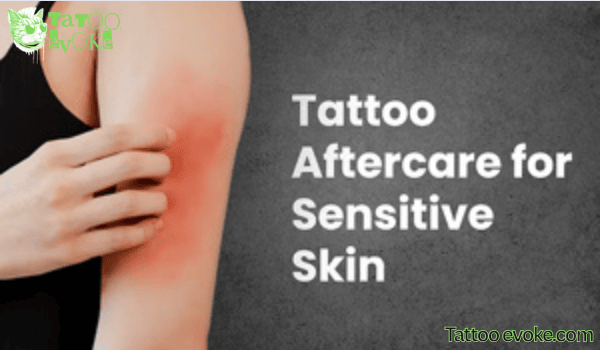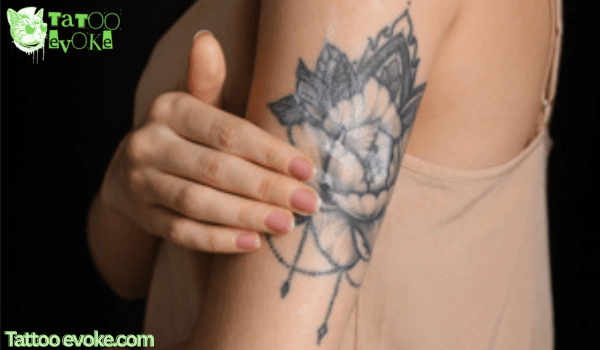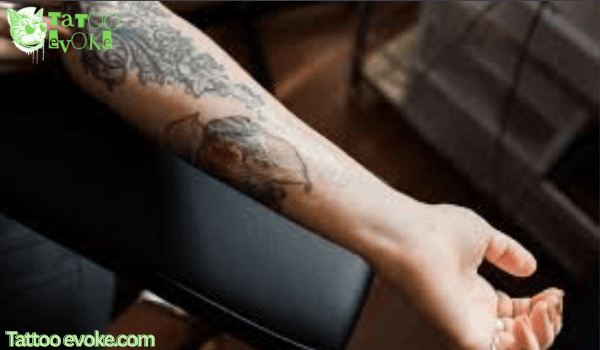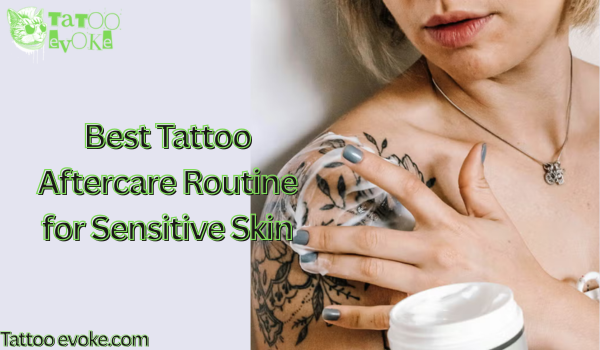Introduction
Getting a tattoo is an exciting experience, but if you have sensitive skin, it’s important to take special care during the healing process/procedure. Sensitive skin can react more easily to irritation, redness, or allergic reactions, so following the best tattoo aftercare routine for sensitive skin is important.
Keeping your tattoo looking attractive and reducing stress may be achieved by using hypoallergenic, fragrance-free, and gentle products. Avoiding heavy ointments, fragrant lotions, and harsh soaps will speed up healing and reduce the chance of irritation.
By following a modified aftercare routine designed for sensitive skin, you can ensure your new tattoo heals properly and maintains its appearance/look for years to come.
Understanding Tattoo Aftercare for Sensitive Skin

A new tattoo needs a little more attention if you have sensitive skin. Sensitive skin can react faster, causing irritation, redness, or a slower process of healing or recovery. To ensure that your tattoo heals properly and looks its best, it’s important to keep to the best tattoo aftercare routine for sensitive skin.
Many things can affect sensitive skin—like your genes, weather, or strong skincare products. Harsh soaps, scented creams, or thick ointments can irritate your skin and slow down healing/recovery. Rather, use gentle, fragrance-free products made for sensitive skin.
when you follow a care routine that fits your skin’s needs, you help your tattoo heal quicker, stay bright, and avoid problems later.
Immediate Steps after Getting a Tattoo
Best Tattoo Aftercare Routine for Sensitive Skin: First 24 Hours
Why the First Bandage Matters
Right after your tattoo is done, your artist will cover it with a bandage. This first step is very important, especially for sensitive skin. Here’s why:
- Protects from germs – The bandage keeps dirt and bacteria away from your fresh tattoo.
- Soaks up extra fluid – It catches any blood, ink, or plasma that may leak out.
- Prevents rubbing – It stops clothes or sheets from rubbing and irritating your skin.
If your skin is sensitive, ask for a breathable bandage like Saniderm or Tegaderm. These are clear and stick well, while still letting your skin breathe and make well.
When to Take Off the Bandage
How long you should keep the bandage depends on what kind it is:
- Plastic wrap: Remove it after 2 to 4 hours.
- Saniderm or Tegaderm: You can leave it on for 3 to 4 days, unless it gets loose or leaks.
Always follow your artist’s advice. If the bandage comes off early, gently wash the tattoo with warm water and a soft, fragrance-free soap.
Taking the right steps in the first 24 hours is key. This helps your tattoo heal faster, keeps your skin calm, and avoids any early problems.
When and How to Remove the Bandage Safely
Gentle Cleaning: The Foundation of Aftercare
Safe Cleaning Practices and Recommended Products
After getting a tattoo, it’s important to take off the bandage at the right time. If you’re using plastic wrap, you should do it within a few hours, but if you’re using a breathable film like Saniderm, you should wait 24 to 72 hours. Always follow the advice of your tattoo artist about your skin type.
When the time comes, take your time and be gentle when removing the bandage. Use lukewarm water to remove the bandage if it remains to your skin. Your healing tattoo may be harmed if you pull or tear it off, especially if your skin is sensitive
Once the bandage is off, begin the best tattoo aftercare routine for sensitive skin by washing your tattoo gently. Use lukewarm water and a mild, fragrance-free soap that is safe for sensitive skin. Avoid strong soaps or anything with alcohol, as these can cause irritation.
After washing your hands, gently clean the tattoo with your fingertips. Avoid scrubbing or rubbing. Use a fresh, gentle towel to pat dry, or allow it to air dry. Always use gentleness; your tattoo needs easy handling, much like an open wound.
Recommended products for cleaning:
Cetaphil Gentle Skin Cleanser
Aveeno Fragrance-Free Body Wash
Dr. Bronner’s Baby Unscented Soap
Keeping your sensitive skin calm and avoiding infection are two benefits of using the proper cleaning technique and gentle products. For best results, clean your tattoo 2 to 3 times a day for the first several days.
Best Tattoo Moisturizers for Sensitive Skin: Hydration Tips

Product Recommendations and Application Techniques
Moisturizing is a key step in the best tattoo aftercare routine for sensitive skin. It help your tattoo heal well, prevents dryness, reduces itching, and protects against scabbing and fading/disappearance. but, people with sensitive skin need to be extra careful to choose gentle, non-irritating products.
Top Moisturizers for Sensitive Tattooed Skin
CeraVe Daily Moisturizing Lotion
A top-rated option for sensitive skin. CeraVe contains ceramides and hyaluronic acid, which help repair the skin’s natural barrier and keep moisture. It’s light-weight, fragrance-free, non-greasy, and quickly absorbed—making it best for every day use on healing/improvement tattoos.
Expert Tip:
Dermatologists often recommend CeraVe for healing tattoos because it’s developed with skin specialists and safe for even eczema-prone skin.
Aquaphor Healing Ointment (Fragrance-Free)
This solid ointment creates a protective/defensive layer over the tattoo, helping retain moisture in the first few days. It’s excellent for dry or flaky skin, and it protects against external irritants.
Expert Tip:
Use Aquaphor only in a thin layer. Overuse may clog pores or slow down the healing if applied too thickly.
Aveeno Daily Moisturizing Lotion
This lotion uses colloidal oatmeal to soothe and protect irritated skin. It’s hypoallergenic, non-comedogenic, and perfect for calming redness or dryness during tattoo healing.
Expert Tip:
Tattoo artists often suggest Aveeno for people with mild skin sensitivities because it hydrates totally without harsh chemicals.
Hustle Butter Deluxe (Natural & Vegan)
a favorite in the tattoo world, Hustle Butter is packed with shea butter, mango butter, and coconut oil. It’s all-natural, vegan, and petroleum-free, making it great for sensitive skin types.
Expert Tip:
Hustle Butter can be used before, during, and after the tattooing process/method—reducing redness and irritation/swelling from the start.
Pure Shea Butter or Aloe Vera Gel (100% Natural)
Both are gentle, natural options. Shea butter offers deep hydration and anti-inflammatory benefits, while aloe vera soothes burning or itching.
Expert Tip:
Always use pure, additive-free versions. Many store-bought aloe products include alcohol or dyes that can irritate healing/improvement tattoos.
Application Tips for Best Results
Wash your tattoo with mild, fragrance-free soap and gently pat it dry with a clean towel.
Apply a thin layer of moisturizer—don’t overdo it.
Moisturize 2–3 times daily, especially if your skin feels tight or peeling.
Avoid over-moisturizing to avoid blocked pores and excess moisture increase.
By choosing one of these best tattoo moisturizers for sensitive skin, and following expert-backed application techniques, you give your tattoo the best chance to make well wonderfully—without irritation or fading/disappearance.
Best Tattoo Aftercare Routine for Sensitive Skin: Preventing Irritation
Extra care must be taken while applying a new tattoo to sensitive skin. The following are important guidelines to avoid discomfort and promote/maintain proper healing:
Avoid scented products: Fragrances in lotions and soaps can cause rashes and allergic reactions. Use gentle, fragrance-free products at all times.
Do not scratch or peel: Let scabs fall off naturally. Scratching can damage the skin and twist the tattoo design.
Limit sun and water exposure: Maintain your tattoo out of direct sunlight and avoid saturated it in pools, baths, or dirty water.
Wear breathable clothing: Tight clothes can rub against the tattoo and cause irritation/pain. select soft, loose fabrics.
After cleaning the area with a gentle, hypoallergenic soap, dry it with a clean towel. Use a small layer of the suggested/advised moisturizer, such as Aquaphor or CeraVe. Your tattoo will heal smoothly and remain attractive if you follow these aftercare instructions for sensitive skin, which help avoid redness, itching, and infections.
Best Tattoo Aftercare Routine for Sensitive Skin: Monitoring the Healing Process
To make sure a easy healing process, it’s important to monitor your tattoo’s healing, specifically for sensitive skin. Identifying regular healing signs versus complications can help avoid problems.
Normal healing symptoms: Slight redness, mild swelling, and peeling are typical as your tattoo heals. Itching may also occur but must be slight and temporary.
Complications to watch for: Excessive swelling, pus, or persistent redness should signal an infection. If you experience extreme pain or hot skin, seek medical attention right now.
Best Tattoo Aftercare Routine for Sensitive Skin: Long-Term Tattoo Care

To maintain your tattoo’s vibrancy and promote long-term skin health, it’s important/essential to follow a regular aftercare routine. The best tattoo aftercare routine for sensitive skin helps protect/defend both the tattoo and your pores and skin in the long run.
Moisturize regularly: continue using a gentle, fragrance-free moisturizer to maintain the skin hydrated and keep away from fading.
Use sunscreen: apply SPF 30 or higher on your tattoo to protect it from UV harm, which can cause staining.
live hydrated: drinking plenty of water helps skin fitness and helps maintain the tattoo’s appearance/look.
Expert Advice: Best Tattoo Aftercare Routine for Sensitive Skin
When it comes to the best tattoo aftercare routine for sensitive skin, professional advice is important for best healing. Experts recommend/advise using fragrance-free, gentle products like CeraVe or Aquaphor to prevent irritation. Always clean/wash your tattoo with mild soap and avoid harsh chemicals. Many people ask how long the healing process takes—naturally, it’s about 2-3 weeks, but full healing/improvement can take up to 6 months. If you experience extraordinary pain or infection signs, seek medical advice. Following these tips ensures your tattoo heals well without complications.
Conclusion: Best Tattoo Aftercare Routine for Sensitive Skin
In conclusion, following the nice tattoo aftercare ordinary for sensitive skin is important for recuperation your tattoo smoothly and keeping it colourful. Always use gentle, perfume-free products like CeraVe or Aquaphor, and keep away from harsh chemical compounds. Remember, all people’s pores and skin is different, so it’s important to discover what works best for you. If unsure, always seek advice from your tattoo artist or a dermatologist for personalized advice. Through looking after your skin and your tattoo, you ensure lengthy-lasting, beautiful results with minimum complications.
FAQs
What should I avoid during tattoo healing if I have sensitive skin?
Avoid exposing your tattoo to direct sunlight, soaking it in water (like swimming or baths), and using scented or alcohol-based products. These can irritate sensitive skin and hinder the healing process.
Are there specific soaps recommended for tattoo aftercare on sensitive skin?
Yes, opt for mild, fragrance-free soaps like Cetaphil Gentle Skin Cleanser or Dr. Bronner’s Baby Unscented Soap, which are gentle on sensitive skin and help prevent irritation.
Can diet impact tattoo healing for sensitive skin?
Maintaining a balanced diet rich in vitamins and staying hydrated can support skin health and aid in the healing process of your tattoo.
When should I consult a professional about my healing tattoo?
If you notice signs of infection, such as excessive redness, swelling, pus, or if the tattooed area feels hot to the touch, seek medical advice promptly.
How long does it take for a tattoo to heal on sensitive skin?
Tattoo healing time for sensitive skin can take around 2–4 weeks on the surface, but complete healing may take up to 6 months. Proper aftercare helps speed up the process.
Explore More: Related Article
What Soap Should I Use to Wash My Tattoo? A Comprehensive Guide to Safe Aftercare
7 Reasons Why is CeraVe Lotion Good for Tattoos : Expert Insights
